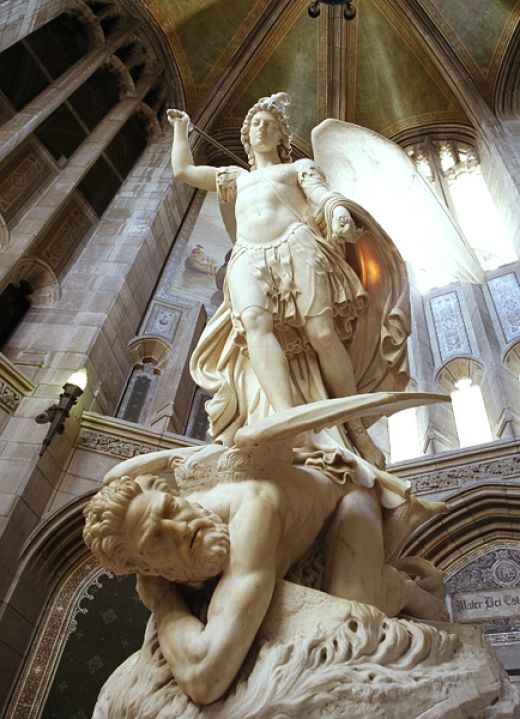
-by Scipione Tadolini, “St Michael the Archangel”, 1865, Marble sculpture, Rotunda, Gasson Hall, Boston College.
“Be sober and vigilant. Your opponent the devil is prowling around like a roaring lion looking for [someone] to devour. Resist him, steadfast in faith, knowing that your fellow believers throughout the world undergo the same sufferings. The God of all grace who called you to His eternal glory through Christ [Jesus] will Himself restore, confirm, strengthen, and establish you after you have suffered a little. To Him be dominion forever. Amen.” 1 Peter 5:8-11
The last thing the Enemy wishes is our despair.
Satan’s Tools
There is a story about Satan selling some of his tools at a garage sale he was giving. There on tables grouped by importance were his bright, shiny but deadly trinkets.
One could find tools that made it easy to tear others down. And for those who had big egos, there were lenses for magnifying one’s own importance, but if you looked through them the other way, you could also use the lens to belittle others.
An unusual assortment of gardening implements stood together with a guarantee to help your pride grow by leaps and bounds. Also in prominence was the rake of scorn, the shovel of jealousy for digging a pit for your neighbor, tools of gossip and backbiting, of selfishness and apathy.
All of these were pleasing to the eye and came complete with great promises and guarantees of prosperity. The prices, of course, were steep but a sign declared “Free Credit Extended” to all. “Take at least one home, use it. You don’t have to pay until later!” old Satan cried rubbing his hands in glee.
One prospective buyer was looking at all the things offered when he noticed two well-worn, non-descript tools standing in one corner. Not being nearly as tempting as the other items, he found it curious that these two tools had price tags higher than any other.
When he asked why, Satan just laughed and said, “Well, that’s because these two are more useful to me than the others. I can pry open and get inside a person’s heart with these when I cannot get near them with my other tools. Once I get inside, I can make people do what I choose. They are badly worn because I use them on almost everyone, since very few people know that they belong to me.”
Satan pointed to the two tools, saying, “You see, I call that one Doubt and the other Discouragement. Those will work when nothing else will.”
Resist him, solid in your faith. We used to call this Spiritual Warfare. The Lord’s love is infinitely stronger than any evil. He is God. He cannot be defeated. The Prince of Lies wishes us to believe he can defeat Him. It is a lie. Do not listen to him. With the power of prayer and trust in the Lord, banish the Liar to the void of suffering from whence he came for his rebellion against God, to which he wishes to drag us all. Resist him, solid in your faith.
Saint Michael the Archangel,
defend us in battle;
be our protection against the wickedness and snares of the devil.
May God rebuke him, we humbly pray:
and do thou, O Prince of the heavenly host,
by the power of God,
thrust into hell Satan and all the evil spirits,
who prowl about the world seeking the ruin of souls.
Amen.
By the intercession of St. Michael and the celestial Choir of Seraphim, may the Lord make us worthy to burn with the fire of perfect charity. Amen.
By the intercession of St. Michael and the celestial Choir of Cherubim, may the Lord grant us the grace to leave the ways of sin and run in the paths of Christian perfection. Amen.
By the intercession of St. Michael and the celestial Choir of Thrones, may the Lord infuse into our hearts a true and sincere spirit of humility. Amen.
By the intercession of St. Michael and the celestial Choir of Dominions, may the Lord give us grace to govern our senses and overcome any unruly passions. Amen.
By the intercession of St. Michael and the celestial Choir of Powers, may the Lord protect our souls against the snares and temptations of the devil. Amen.
By the intercession of St. Michael and the celestial Choir of Virtues, may the Lord preserve us from evil and falling into temptation. Amen.
By the intercession of St. Michael and the celestial Choir of Principalities, may God fill our souls with a true spirit of obedience. Amen.
By the intercession of St. Michael and the celestial Choir of Archangels, may the Lord give us perseverance in faith and in all good works in order that we may attain the glory of Heaven. Amen.
By the intercession of St. Michael and the celestial Choir of Angels, may the Lord grant us to be protected by them in this mortal life and conducted in the life to come to Heaven. Amen.
O glorious prince St. Michael, chief and commander of the heavenly hosts, guardian of souls, vanquisher of rebel spirits, servant in the house of the Divine King and our admirable conductor, thou who dost shine with excellence and superhuman virtue deliver us from all evil, who turn to thee with confidence and enable us by your gracious protection to serve God more and more faithfully every day.
Pray for us, O glorious St. Michael, Prince of the Church of Jesus Christ, that we may be made worthy of His promises.
Almighty and Everlasting God, Who, by a prodigy of goodness and a merciful desire for the salvation of all men, has appointed the most glorious Archangel St. Michael, Prince of Thy Church, make us worthy, we beseech Thee, to be delivered from all our enemies, that none of them may harass us at the hour of death, but that we may be conducted by him into the August Presence of Thy Divine Majesty. This we beg through the merits of Jesus Christ Our Lord.
Amen.
http://en.wikipedia.org/wiki/Theodicy

-by Rev. Andrew Hofer, OP, teaches at the Dominican House of Studies in Washington, DC. This article comes from the September 2011 issue of The Irish Rover, a newspaper produced by students at the University of Notre Dame.
““How do we reconcile God’s omnipresence with the existence and agency of the Devil and with the presence of sin and evil in general?”
A perennial problem in human thinking is the question of good and evil. How can we reconcile the presence of God and the presence of evil forces that we experience in the world? In Christianity, Gottfried Leibniz (d. 1716) was especially famous for framing the question of theodicy, that is, how to justify God when we face the problem of evil.
If God is infinitely good, all-powerful, omnipresent, and all-loving, how could there be evil forces at work in creation? Various approaches are taken to answer this today. One approach is to be silent in the face of the mystery of suffering.
For some of those who articulate an answer, it seems that God has too exalted a job description! They want to lessen God’s descriptions. God isn’t REALLY almighty, they say. He’s working out His salvation, and ours, in a complex cosmos.
An even more serious objection arising from the question of evil is that God simply doesn’t exist. This modern-sounding objection is, in fact, one that St. Thomas Aquinas considers when asking “Does God exist?” in SUMMA THEOLOGIAE Ia, q. 2, a. 3. The objection runs like this. It seems that God does not exist. If one of two contraries is infinite, the other would be totally destroyed. But this word “God” is understood to mean infinite goodness. If therefore God exists, evil couldn’t be found. But evil is found in the world. Therefore God does not exist.
Few people may go through this reasoning in a logical syllogism, but many people wonder along those lines when bad things happen. How could God let my friend suffer and die? Where was God in the September 11 attacks against America ten years ago? Individual painful experiences such as these can drive people to agnosticism or atheism.
For his part, St. Thomas answers the objection from evil concerning God’s existence with a quotation from St. Augustine: “Since God is the highest good, He would not allow any evil to exist in His works, unless His omnipotence and goodness were such as to bring good even out of evil.” St. Thomas continues to say that this is actually a part of God’s infinite goodness: He allows evil—and out of that evil produces good. In other words, God does not directly will evil, and when He declines to prevent it (see Job), He who made creation from nothing has a plan to make something very good out of the disorder of evil.
In responding to the question of evil, the Catechism of the Catholic Church says, “No quick answer will suffice…. THERE IS NOT A SINGLE ASPECT OF THE CHRISTIAN MESSAGE THAT IS NOT IN PART AN ANSWER TO THE PROBLEM OF EVIL” (309). In the world that we have, with its freedom and the misuse of freedom in sin, there are devils and sinners. God doesn’t obliterate devils after their fall, which was their irrevocable everlasting choice against God’s goodness. God created devils originally as good angels, and their own choice to turn away from Him does not cause God to destroy them. He also doesn’t obliterate us human sinners. Even when God’s own Son became man and was crucified by evil forces, by our sins, God did not obliterate His creation. He showed that the horror imposed upon Jesus could be used for our salvation. In fact, it is by “his wounds we are healed” (Isa 53:5). When we experience evil personally, when we suffer, it is an invitation to be united with Jesus, “to fill up what is lacking in the sufferings of Christ” (Col 1:24).
For nearly 2,000 years, Christians have proclaimed to the world that “Jesus Christ is risen from the dead.” His Resurrection beckons us to live by the Holy Spirit and see how no evil, however horrible it is, can be a match for God’s almighty goodness. It doesn’t make everything easy in this world. But our faith in the Resurrection, where God triumphs over ALL evil forces, sustains us. The mystery of God’s triumph calls us both to silent prayer at the foot of the Cross, and to joyful preaching of the Good News.”
Love,
Matthew
